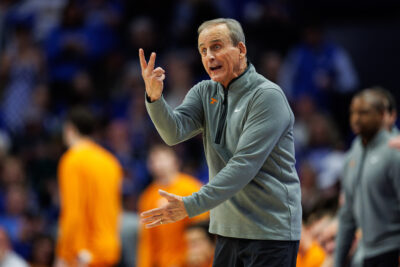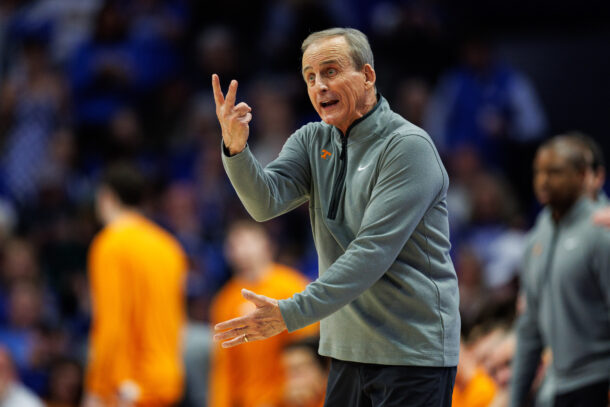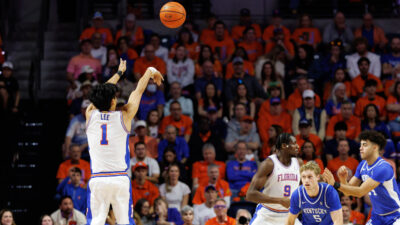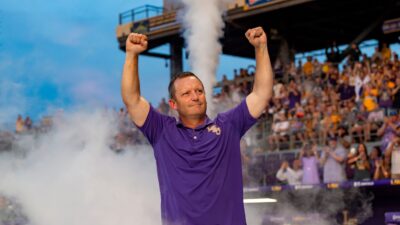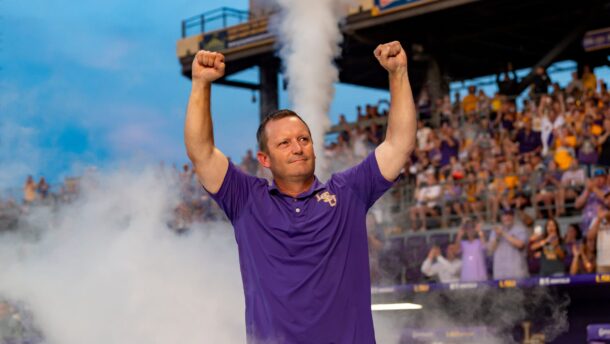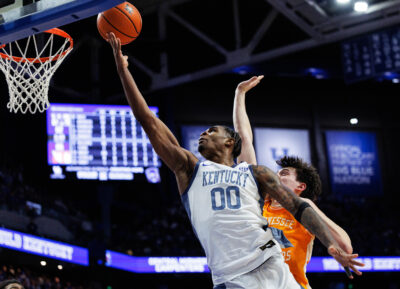Louisville has a rich, though checkered college basketball history.
The Cardinals raised championship banners, had one taken down, and produced some of the greatest players ever to play the game while bouncing around from the Missouri Valley and Metro conferences, Conference-USA, the Big East and now the ACC. They’ve been up and they’ve been down. But the the arrival of coach Pat Kelsey in 2024-25, they appear ready to regain their status as one of the nation’s elites.
This page explores Louisville’s basketball history, best players, teams, coaches and more.
How Many Times Has Louisville Won The NCAA Tournament?
Three (sort of). The Cardinals have 2 national championships the NCAA recognizes – the one they earned in 1980 by beating old nemesis UCLA in Indianapolis and their 1986 title victory against Duke in Dallas. They also cut down the nets by beating Michigan in Atlanta in 2013. But that championship was vacated as punishment for NCAA violations.
How Many Times Have The Cardinals Been to The Final Four?
Ten, including 2 that were vacated in 2012 and 2013. The 8 that are still official came in 1959, 1972, 1975, 1980, 1982, 1983, 1986 and 2005.
Louisville’s National Championship Teams
Here’s a brief look at the Cardinals’ NCAA Tournament championships teams, including the one whose accomplishment was expunged from the record, and how they conquered March Madness.
1980: 33-3, NCAA champion
1980 NCAA Tournament path: Louisville was the No. 2 seed in the Midwest Region.
- Round 2: defeated No. 7 seed Kansas State 71-69 (OT)
- Sweet 16: defeated No. 6 seed Texas A&M 65-55 (OT)
- Elite Eight: defeated No. 1 seed LSU 86-66
- Final Four: defeated No. 80-72
- Championship: defeated UCLA 59-54
Season in review: While the NCAA rescinded its rule prohibiting dunking 3 seasons earlier, the 1979-80 Cardinals were the first to truly embrace it. Known as “The Doctors of Dunk” because of their high-flying style, embodied by national Player of the Year Darrell Griffith, they powered their way through the Metro Conference season undefeated. But despite being ranked No. 2 in the final regular season poll, their championship run nearly ended before it could get started. Louisville was forced to overtime in each of its first 2 NCAA Tournament games before coming to life in a 20-point rout of top-seeded LSU in the Midwest Region Final. They then caught a break by playing 2 unranked teams in the Final Four at Indianapolis’ Market Square Arena, beating UCLA in the final behind 12 points from Most Outstanding Player Griffith.
1986: 32-7, NCAA champion
1986 NCAA Tournament path: Louisville was the No. 2 seed in the West Region.
- Round 1: defeated No. 15 seed Drexel 93-73
- Round 2: defeated No. 7 seed Bradley 82-68
- Sweet 16: defeated No. 3 seed North Carolina 94-79
- Elite Eight: defeated No. 8 seed Auburn 84-76
- Final Four: defeated LSU 88-77
- Championship: defeated No. 1 Duke 72-69
Season in review: The 1985-86 Cardinals weren’t nearly as dominant as their national championship predecessor 6 seasons earlier. But they were a group of solid players who knew their roles and fit together well. All 5 starters averaged double-figure scoring that season, with seniors Billy Thompson and Milt Wagner – long-time friends from Camden, N.J. – leading the way. But when it got to crunch time in the NCAA championship game against Duke, it was 6-foot-9 freshman center Pervis Ellison who stepped up to earn Most Outstanding Player honors. “Never Nervous” Pervis led a comeback that saw Louisville erase a 6-point deficit in the final 7 minutes while finishing with 25 points and 11 rebounds while making 10 of his 13 field goal attempts and 2 clinching free throws with 27 seconds remaining.
2013: 35-5, NCAA champion (vacated)
1986 NCAA Tournament path: Louisville was the No. 1 seed in the Midwest Region.
- Round 1: defeated No. 16 seed North Carolina A&T 79-48
- Round 2: defeated No. 8 Colorado State 82-56
- Sweet 16: defeated No. 12 seed Oregon 77-69
- Elite Eight: defeated No. 2 seed Duke 85-63
- Final Four: defeated Wichita State 72-68
- Championship: defeated No. 10 Michigan 82-76
Season in review: Led by the dynamic backcourt of Russ Smith and Peyton Siva, the Cardinals bounced back from a mid-season 3-game losing streak to win 14 of the next 15 games – including 3 straight to claim the Big East Tournament championship – to build momentum for a national title run. An ugly injury to key reserve Kevin Ware just before halftime in an Elite Eight blowout of Duke threatened to derail Louisville. But fellow reserve Luke Hancock, who averaged only 8 points during the reseason, stepped up to fill the void. He scored 20 points in a semifinal win against Wichita State and 22 in the final against Michigan to win the Most Outstanding Pfflayer award. The championship was later taken away and the banner lowered from the rafters at Yum! Center because of NCAA violations.
Louisville’s Hall of Fame Coaches
Denny Crum
Record at Louisville: 675-295
Overall record: 675-295
NCAA Tournament titles: 1
Notable: A disciple of legendary UCLA coach John Wooden, Crum was an immediate success at Louisville. He took the Cardinals to the Final Four in his first season, 1971-72. It was the first of his 5 Final Four trips during his 29-year tenure. After 4 successful tries, Crum finally won his national championship by beating Duke and another heavyweight, Mike Krzyzewski, in 1986. Known for his trademark red blazer, Crum was named National Coach of the Year 3 times and was inducted into the Naismith Hall of Fame in 1994, where he was presented by his former coach, Wooden.
Rick Pitino
Record at Louisville: 293-140*
Overall record: 761-307
NCAA Tournament titles: 1*
Notable: Pitino caused a stir in the Bluegrass State by coming to Louisville after he was let go by the Boston Celtics of the NBA. Pitino had previously coached the Cardinals’ in-state rival Kentucky, winning a national championship with the Wildcats. And there was initial animosity among fans of both schools. Louisville quickly warmed up to Pitino once he began returning the Cardinals to national prominence. His 2012 team made it to the Final Four and his 2013 won the national championship before having both appearances vacated by a scandal that eventually led to him losing his job in 2017.
*-96 wins from the 2012, 2013 and 2014 seasons have been vacated by the NCAA
Louisville’s First-Round NBA Draft Picks
The Cardinals have had 25 players selected in the first round of the NBA Draft. They are Donovan Mitchell (2017, Denver, No. 13 overall), Terry Rozier (2015, Boston, 16), Gorgui Dieng (2013, Utah, 21), Terrence Williams (2009, New Jersey, 11), Earl Cook (2009, Phoenix, 14), Francisco Garcia, 2005, Sacramento, 23), Reece Gaines (2003, Orlando, 15), Samaki Walker (1996, Dallas, 9), Clifford Rozier (1994, Golden State, 16), Greg Minor (1994, LA Clippers, 25), LaBradford Smith (1991, Washington, 19), Felton Spencer (1990, Minnesota, 6), Pervis Ellison (1989, Sacramento, 1), Kenny Payne (1989, Philadelphia, 19), Billy Thompson (1986, Atlanta, 19), Lancaster Gordon (1984, LA Clippers, 8), Rodney McCray (1983, Houston, 3), Darrell Griffith (1980, Washington, 2), Wesley Cox (1977, Golden State, 18), Junior Bridgeman (1975, LA Lakers, 8), Butch Beard (1969, Atlanta, 10), Wes Unseld (1968, Washington, 2), Charlie Tyra (1957, Fort Wayne Pistons, 2), Bob Lochmueller (1952, Syracuse Nationals, 8).
All-Time Starting Five
Point guard: Russ Smith
The leader both on and off the court of the Cardinals’ third (and vacated) national championship team, Smith is Louisville’s all-time leader in steals with 27. He’s also No. 5 on the school’s career scoring list with 1,908 points. Smith averaged 18.7 points and 2.9 assists per game during the Cardinals run to the championship. But it wasn’t until the following season, when he posted similar numbers, that he was finally recognized as a first-team All-American. His No. 2 was retired during the 2021-22 season.
Shooting guard: Darrell Griffith
A flashy, above-the-rim player before everyone was able to do it, Griffith earned the nickname “Dr. Dunkenstein” for his athleticism and spectacular dunks despite being only 6-4. He was the 1980 Player of the Year and consensus first-team All-American leading Louisville to its first national championship, a goal he promised fans of his hometown school when he committed to the Cardinals. Griffith scored in double figures in 111 of his 126 games and his 2,333 career points and single-season 825 points in 1979080 are both still school records.
Small forward: Junior Bridgeman
The first star of the Denny Crum era, Bridgeman was an outstanding all-around player who shot 51.7% from the floor while averaging 15.5 points, 7.6 rebounds and 2.7 assists in his 3 seasons with the Cardinals. He was named Missouri Valley Conference Player of the Year in both 1974 and 1975, the latter of which he earned first-team All-American honors while helping Louisville to the Final Four. He was drafted in the first round by the Lakers and went on to a long, successful career in the NBA.
Power forward: Pervis Ellison
Ellison is best remembered for his 25-point, 11-rebound performance in the national championship game against Duke that won him Most Outstanding Player honors at the 1986 Final Four. But that was just the jumping-off point for a standout career in which he became the only Louisville player to score more than 2,000 points and bring down 1000-plus rebounds in his career. The 6-foot-9 All-American also set a school record by blocking 374 shots before becoming the No. 1 overall pick in the NBA Draft by the Sacramento Kings in 1989.
Center: Wes Unseld
Unseld was undersized for a center even for his time at 6-7. But there has never been a fiercer rounder and low-post in college basketball history. Unseld played only 3 seasons, but he still ranks among the top 10 in Louisville history in scoring with 1,686 points and rebounds with 1,551. His 20.6 career scoring average and 18.9 rebound average remain the best in school history, as is the single-game record of 45 points he scored in the first game of the 1967-68 season. Unseld continued his success in the NBA with the Baltimore and Washington Bullets and was inducted into both the College Basketball and Naismith Basketball Hall of Fame.
Scandals
Louisville has been involved in some of the most highly-publicized scandals in college basketball history.
In 2015, the Cardinals made headlines when allegations surfaced that a university employee affiliated with the team paid for strippers and prostitutes to perform sexual acts with as many as 17 team members and prospective recruits between 2010-14. Following an investigation, the university self-imposed a ban for the 2016 NCAA Tournament. But the NCAA took the penalties further with a scholarship reduction, a suspension for coach Rick Pitino and the vacating of wins. Including the Cardinals’ participation in the 2012 and 2013 Final Fours.
Things only got worse in 2017.
As the result of a corruption scandal in which Adidas illegally paid players to steer them to programs the shoe company sponsored and implicated officials at several schools, Pitino was fired on Sept. 27, 2017.
Then in 2021, former Louisville assistant coach Dino Gaudio was convicted and sentenced to 1-year probation and a $10,000 fine for attempting to extort coach Chris Mack over allegations of recruiting violations. The allegations proved to be true and eventually cost Mack his job.
The Cardinals were placed on probation and banned from postseason play for 2 years by the NCAA in 1956 for recruiting violations.
Award-winning columnist Brett Friedlander has covered the ACC and college basketball since the 1980s.

